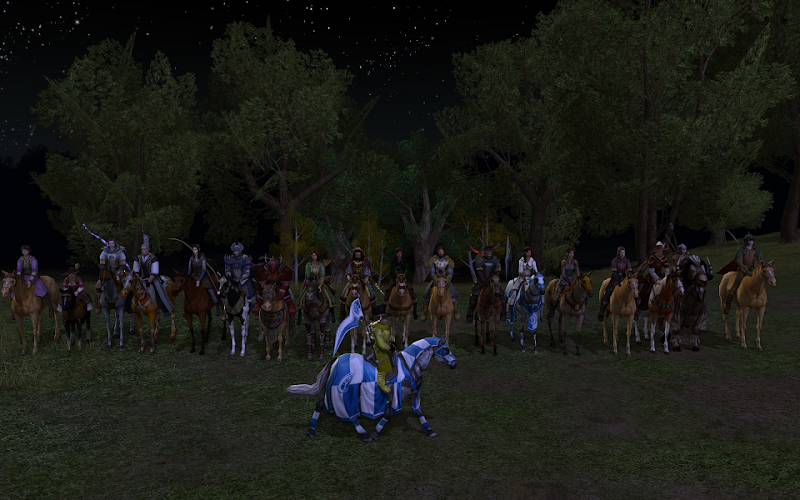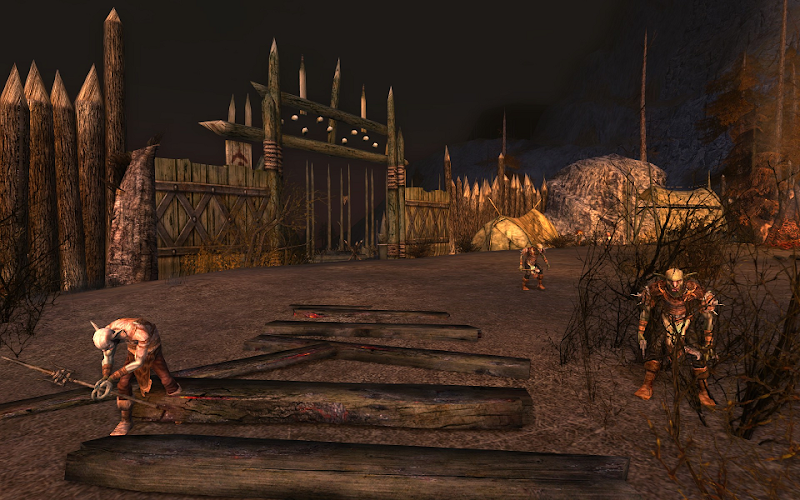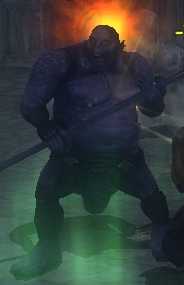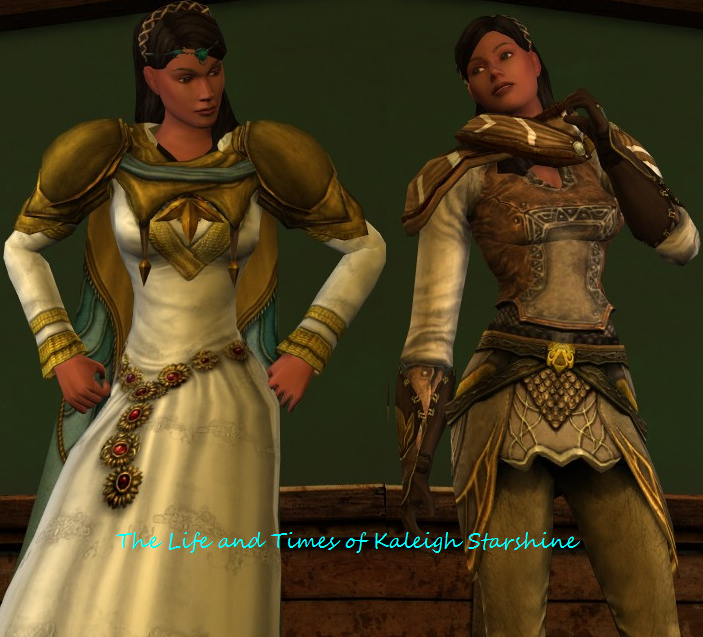Greetings, everyone! By way of explanation, we proudly submit a reprisal of our first play:
Cast of Characters

Gennyrose Greenblossom: The Rose of the Shire, herself!

Kaleigh Starshine: The directionally-challenged Scout

Assorted Free Peoples: Any and all Genny and I can dupe (Revise this! – Genny) persuade to join us!

Assorted Creeps

Assorted Loot Tenants
and

Bigger Creeps
Act One – Scene One
(Gather ye Lords and Ladies fair!)
The show must go on. This is, of course, one of the oldest adages of the theater. It has been not only the impetus that helps keep a play moving forward after a stumble or two but, also, the catalyst for so many wonderful new methods and directions of the stage. And it was this thought that came to me as I spoke with Miss Gennyrose about her Thursday night adventures…
Gennyrose: “I don’t know, Miss Kaleigh. It seems we have explored much of the depths of Moria by now, and it may be time to lend our aid elsewhere, to others who may have more need of it.”
Kaleigh: “Have you noticed all those camps strewn all about the lands these days, even in the Shire?”
Gennyrose (nodding): “Yes, I have. What do you make of them?”

And so we spoke with those in charge of the camps, and we realized that there really was some good we could do there! But, the thing of it is, we will need many, many friends to join us if we are to make a real dent in the hordes of the enemy.

And that is where you all come in! Yes, even you, Master Locney! We are looking for others to join us as we break not only the fourth wall of the theater, but a few in the creeps’ strongholds as well! By the end of our play, we hope that you might wish to step on stage with us, as we try to make our lands a bit safer, while earning a few shinies on the side!
(curtain falls)
Act One – Scene Two
(Incensives and Incentives)

No doubt most all of you in the audience have visited these camps before, but I will give a quick overview of what is involved. You see, there is an acute shortage of good theater in the land these days. Quality productions, like The Most Unfortunate Hobbit, are few and far between. This is mostly true in the outlying areas, but it can be seen even closer to home as well. One cannot have visited the Prancing Pony in Bree-town in recent days and not seen the pall upon its patrons, nor upon the citizens of the town itself. I have heard the same about those who reside within the Shire as well, like in Tuckborough. Yes, even in the Shire! Good theater has a way of helping to bring out those Shire rainbows and keeping the doledrums at bay!
Our intention is to emulate the success of the Ales and Tales’ traveling pub series by touring through the land and performing wherever we run into folk starved for theater, a traveling repertory if you will. We will perform every Thursday night, beginning at 9:30pm Bywater time, and go on until our players decide it best to leave some material for future showings. Depending upon how well we are received, we may get two, or even three, performances in before the final curtain falls for the evening, but we will see how things go.
I know what you all are thinking. All that travel only to perform in front of audiences decidedly hostile, right? What do the players get out of it? Well, I will tell you!
Firstly, there is nothing that compares to the thrill and the closeness that comes with performing upon the stage with the dearest of friends surrounding you. When the curtain falls, and it is just you and your fellow players together celebrating a wonderful performance, it is truly magical! But not only that, our Wardrobe and Props departments intend to be very generous with our players after a successful performance. Some of the players will be gifted a piece of jewelry someone wore during the show or maybe a garment or two from a worn costume. If we are lucky, some patron of the arts might toss a worn yet still lovely Symbol upon the stage along with all the flowers, and we will cast lots behind the curtain to see who gets to keep it. All will be paid in the currency of marks to be spent at the camps throughout the land, of course, and the wage for a successful show is rather large!
I have to be honest with you all, though. These performances will not be trivial, especially since we intend to perform at the highest levels and for the most difficult of audiences. In our next act, we will examine the thin line between taking a bow…

…versus taking a knee at the end of the performance.

(curtain falls)
Act Two – Scene One
(All the World’s a Stage)

One of the greatest difficulties in theater is managing the egos of the actors. Everyone wants to be the star of the show at one time or another, and I assure you that all members of the Repertory will get their moments front and center. What I think will be our main issue is how we deal with our Antagonists.
You see, unlike certain attic-fearin’, cowbell-playin’ hobbits you may know, Antagonists do not truly desire center stage each and every performance. The fact of the matter is that they often go unappreciated, when all they truly desire is undivided attention as they perform their death scenes. If they do not get it, though, they will throw some awful tantrums, sometimes even onstage! This usually happens when some of the actors miss their marks on the stage, so let us discuss that briefly.
As most of our performances will be in the style of theater-in-the-round, we will need to define our marks by the players. Our stage director, the one wearing all the heavy costume armor, will be in charge of keeping the antagonists’ focus during the performance and will be front-stage, standing with their back to the audience. This is to keep the focus of the audience on the antagonists, especially the big ones, during their tragic death scenes. The antagonists’ marks will then be, of course, just shy of front-center stage, facing the audience, so that they may have their moments of glory.
Where will the rest of the players be, you wonder? Well, I think our marks will be behind the Antagonists, giving us the opportunity to pound them on the back as they perform, letting them know what we think of their performance, even as they perform it! By doing so, we give them their due, and they will exit the stage quickly, if not very gracefully. With this method of acting, all involved should be satisfied, and our performances will go all the more smoothly.
(curtain falls)
Act Two – Scene Two
(Loot Tenants and How to Serve an Eviction Notice)

Unfortunately, it is simply the case that some actors are so temperamental that they require special treatment. They are known in the business as Loot Tenants, probably because they demand on having the biggest trailers and wagons to sulk in when not onstage. For the most part, we will want to focus on these Loot Tenants right when they appear and escort them off the stage before dealing with the lesser antagonists. Having spoken to some of the men in those skirmish camps, I have begun to assemble a few dossiers for the real ornery ones. I will place renderings capturing their likenesses on these easels near the front of the stage while I speak briefly about each one.
Bloodrooks

These awful crebain act more swine than avian, as they tend to ham it up to greater and greater heights the more other antagonists flock to them. The more that are around, the greater the wind beneath its wings blusters, and soon enough, the shrieking can overshadow even the greatest performances by the true leading actors on the stage. The best way to deal with these creatures is to have one of the Repertory, hopefully someone in heavy costume armor, lure the creature away from all the other antagonists with shinies, while the rest of the troupe escorts the others offstage. Then all of the Bloodrook’s bluster will be gone, and he will be off to perch alone again in short order.
Brothers of Destruction

Misery loves company. so they say, and these Brothers revel in each others’ presence, working to take command of the stage on their own terms. They are many, and they can do much to turn a tightly-scripted scene into an evening of bad improvisational theater. Their weakness lies in their cowardly hearts and the way they egg each other on. When they turn up at a show, the best thing to do is have the actor in charge of directing the rest of the troupe’s lines pick one of the Brothers to focus on, with everyone else following suit and directing their lines at the same Brother. He will soon be discouraged and flee the stage, with his siblings following soon after.
Defenders of the Vile

Do not get me wrong, for the stage is one of the greatest places in all the world to express oneself. Unfortunately, some lose all sense of their surroundings when doing so and bloviate well past their allotted stage time. When it comes to the Defenders of the Vile, this is most definitely the case. They are masters of the filibuster, but we will not let Master Filidor nor any other be hurt by their rhetoric, will we? The worst part of it all is that other antagonists nearby draw strength from the Defender and are much more difficult to persuade to leave the stage as well! The best thing to do is to escort the Defender offstage first, thereby disheartening the rest of his entourage, so that they will be dissuaded from bloviating very quickly.
Dourhand Kegmasters

Do not let the disarming appearance of this Loot Tenant influence you! Once these Kegmasters have drunk to excess, they like to share their drink with others onstage in an excessively boorish manner. They like to drop a cask of ale and light it on fire, scorching all nearby! Not only is that a waste of good ale, but it is in very poor taste, and these malcontents should be escorted off the stage with all alacrity.
Echoes of Death

The willing martyrs of poor behavior, these creatures empower all the other antagonists onstage once they have performed their death scene. Therefore, unlike most of the other Loot Tenants, it is best to give them their stage-time and not even engage them until all the other troublemakers are finished off. Once that has happened, the only echo given off by this foe will fall upon deaf ears.
Frigid Squalls

Sadly, there are some players who, when their performance is ruined due only to their own unpreparedness, try to ruin the performances of the other actors around them as well. This is the case in regard to the cold-hearted Frigid Squalls, for when they are about to exit the stage, they cry out to all around them, devastating the morale of even the most seasoned actors. One trick to prevent this is to stun or incapacitate the Squall when it is near to giving its death throes, perhaps by a Scout improvising a coordinated attack, and then the rest of the troupe shouting the Squall down before it can act again.
Leadfoot Brute

You may have heard of a method used upon the stage referred to as ‘kiting’, I suppose? Normally, the only time I would advocate that style of performing is when one has a long piece of twine in hand while trying to launch a pretty thing into the sky. In the case of the Leadfoot Brute, however, only the sturdiest of performers can even stand up to a single stomp from its boots. Thus, one proven technique for dealing with these blowhards is to have whomever has been unfortunate enough to draw its ire run around, while the rest of the players fire off barbs against it, until it has been shamed enough to leave the stage.
Priests of Vengeance

One of the greatest strengths any actor can be gifted with is the ability to keep a level spirit in the face of harsh criticism. There will always be someone who comes along that will not like your work, but you just have to continue on in the best way you can, you know? These Priests of Vengeance go way too far, however. They enable one of their fellow antagonists to not only absorb criticism, but to also reflect it back at the critic with double the venom! They can be outwitted, though! Any troupe that has a scene with this guest star need only to drive the Priest from the stage, being very careful not to strike any of its supporting cast. Once the Priest is back in his wagon, the rest of the mob can be brought into line.
Zealots of Pain

Much like the Echoes of Death, these zealots are better off to their cause once they have acted their death scene, inspiring their supporting cast to try to take over the stage. By eliminating the supporting roles first, the zealot will have no one left to inspire, and his run on the stage will end quickly.
So, with the proper method acting, we will be able to evict these Loot Tenants from the stage, thereby ensuring the success of the play! Now, finally, we can…
*after noticing some snickering in the audience turns to look at the renderings on the easels*

(curtain falls)
Act Three – Scene One
(Casting Lots and Lots of Shinies!)

Our play is nearly over, but we have saved something very special for the denouement. After the lead Scout has taken her extra share (Revise this! – Genny), it is time for all the players to gather around the table and divide the proceeds of the show! The circumstances necessitating the method we will use are rather unique to the theaters we will be playing in, so allow me to explain…
Firstly, the greatest proceeds derived from performing a skirmish play can only be awarded weekly. I suppose that makes sense, as not many folk go to the theater twice in a week to see the same play! These proceeds come in the form of the superior mark currency, the props and costumes, and any Symbols thrown upon the stage by our adoring fans. Therefore, we will try to perform a play that none in our troupe have performed during that weekly interval. The interval begins anew during the wee hours of Thursday morning, which is partly why we have chosen that day for our performances, likely making the chance of a repeat showing very low.
Another issue is that other companies will be performing soon after us, and we will have but scant minutes to divide all the proceeds before we are summarily ejected from the theater! The owners of the playhouses have no qualms about tossing their weight around, and they want to get new acts in the door as soon as they can, so we will need to divvy the plunder quickly, like within five minutes or so.
While Genny and I discussed simply using the standard roll/pass method for such things, a method used widely in theatrical troupes, we decided that it might be better to handle things more directly. The reason for this is twofold. Firstly, in case someone in our troupe has performed the same play beforehand during the weekly interval, they can still cast lots for a part in the proceeds manually, and we can still give them anything they might win that we have the strength and fortitude to part with, that are not binding, you know? The other reason is that most of the shinies we will likely see tend to be fitting only for certain roles within the troupe, like those who boost morale, or maybe those who Scout or may be archers and such. These items are very binding, and if someone were to cast lots for them without noticing they would not be of much use to them and happened to win one, the others that may have really been able to make use of it would feel rather put out. We will hopefully be performing for a very long run, and we must keep our spirits high!
So what we will do is have everyone cast lots once, after Genny or I have revealed what all lies on the table, and then we will just go in order, letting the highest person have their pick from the lot, and then go down the list until there is nothing left. It would probably be best to pass if their were nothing left that you would find useful, but others could really make use of. After all, when it comes to the Skirmish Repertory Company, there are no small parts, and everybody is a star! When we make someone in the troupe better, we all are the better for it, and I, personally, am greatly looking forward to seeing my dear friends wearing some new earrings or a new pair of sharp-looking boots. And those symbols! Oh, those symbols…
(curtain falls)
Act Three – Scene Two
(Epilogue – The End of the Beginning)

We hope you all enjoyed our very first play! However, the truth is that, even though this part of our season is ending, we have only just begun! Open tryouts are scheduled every Thursday night at 9:30pm Bywater time, so please come out for them! In particular, we are hoping that a few of you who feel comfortable wearing heavy ceremonial armor will come and tryout, for that seems to be the role that we often have trouble filling. There is no need for signups for this, however. We will take you as you are and work with you, and when we have filled our company for the evening, we can put others in the role of understudy, in case a pratfall goes poorly.What a lovely audience you have been! Thank you, one and all!



*laughs* A very humorous and creative post. Well done Miss Kaleigh. I hope that productions begin anew soon.
LikeLike
The first season was a resounding success, and an inspiration to many amateur thespians. How wonderful it would be to see another season!
LikeLike
Pingback: On Par with Radiance? What Has the Pursuit of Group Content Cost Us? | LOTRO Players
Pingback: On Par with Radiance? What Has the Pursuit of Group Content Cost Us? | The Life and Times of Kaleigh Starshine